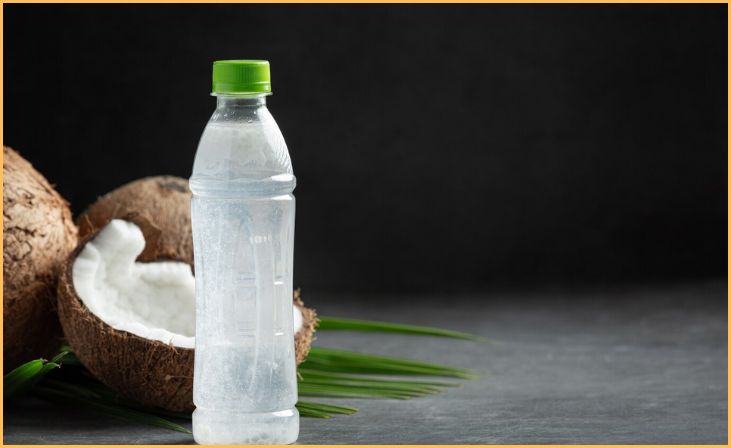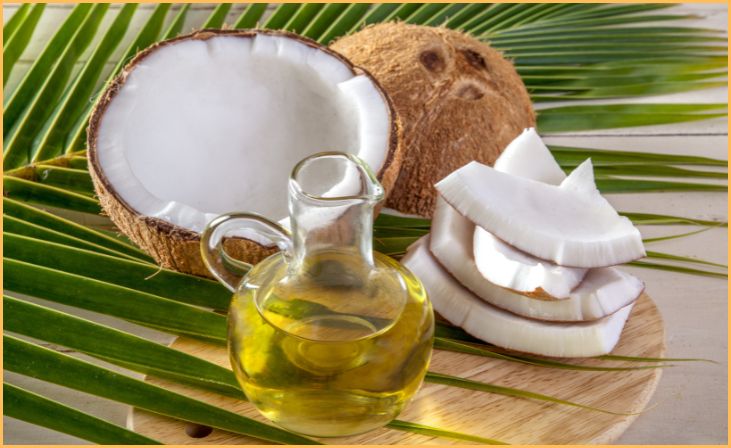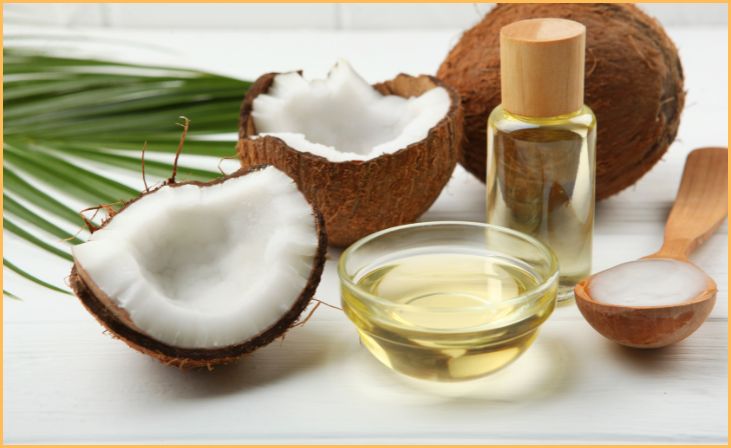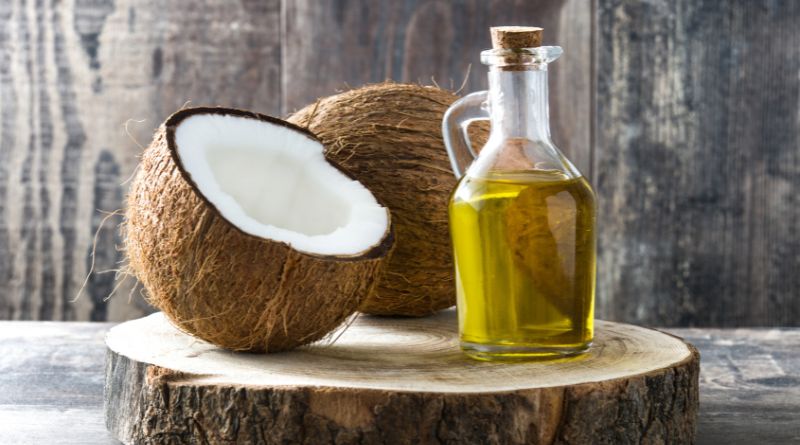Does Coconut Oil Expire: Coconut oil is a modern-day miracle that has improved the quality of our lives. This is the first item we grab for whenever we want to include healthy fats in our meal, offer additional hydration to our hair, or even freshen Fido’s breath. However, due to the vast number of alternatives, it is simple to find ourselves purchasing much more oil than we originally intended.
But, as we all know, weird things happen, and it might take a long time to complete that massive jar. “Does coconut oil have an expiration date?” you may wonder. The quick answer is that coconut oil does have an expiration date.
The long and the short of it is that refined coconut oil will last around 18 months. On the other hand, Virgin coconut oil has a shelf life of up to several years. In addition, Virgin coconut oil keeps more of its natural antioxidants than refined coconut oil, allowing it to be stored longer. Generally, coconut oil produced by a wet-milling technique has a longer shelf life than other types. In other words, chemical-free extraction procedures such as fermentation, chilling, or boiling are used to get the coconut oil.
Does Coconut Oil Expire?

Coconut oil is a popular natural product that has a wide range of uses, from cooking and baking to skincare and haircare. However, like any other product, coconut oil does have a shelf life and can expire over time. In this article, we will explore the topic of coconut oil expiration, including its shelf life, signs of spoilage, and proper storage to maximize its longevity.
- Shelf Life of Coconut Oil: Coconut oil has a relatively long shelf life compared to other oils and fats. When stored properly, unopened coconut oil can last up to two years from the date of production. However, once opened, coconut oil is best consumed within six months to a year for optimal freshness and quality.
- Signs of Spoilage: Coconut oil, like any other oil, may spoil over time. The most common sign of spoilage is a rancid smell. If your coconut oil smells off or has a sour, unpleasant odor, it is likely spoiled and should not be consumed. Additionally, if the oil appears discolored, has a moldy appearance, or develops an unusual texture, it is best to discard it.
- Factors Affecting Shelf Life: Several factors can affect the shelf life of coconut oil. Exposure to heat, light, and air can accelerate the oxidation process, leading to rancidity. It is crucial to store coconut oil in a cool, dark place, away from direct sunlight and heat sources. Additionally, using clean, dry utensils when handling the oil can help minimize the introduction of contaminants that may cause spoilage.
- Refined vs. Virgin Coconut Oil: It is important to note that refined coconut oil typically has a longer shelf life compared to virgin coconut oil. Refined coconut oil undergoes a process that removes impurities and extends its stability. On the other hand, virgin coconut oil is minimally processed and retains more of its natural nutrients, but it may have a shorter shelf life due to its higher moisture content.
Quick Link: Best 9 Tips to Keep Your Curls Healthy and Beautiful
Storage Tips
To extend the shelf life of coconut oil, follow these storage tips:
- Store in a cool, dark place, such as a pantry or cupboard.
- Keep away from direct sunlight, heat, and moisture.
- Ensure the container is tightly sealed after each use to prevent air exposure.
- Avoid using wet or dirty utensils when scooping out the oil.
In summary, coconut oil does have an expiration date, and it is important to be mindful of its shelf life to ensure optimal freshness and quality. Signs of spoilage include a rancid smell, discoloration, moldy appearance, or unusual texture. Proper storage in a cool, dark place away from heat and light, along with using clean utensils, can help maximize the longevity of coconut oil. By following these guidelines, you can enjoy the benefits of coconut oil while ensuring its safety and efficacy.
Improve the Shelf-life of Coconut Oil

Coconut oil has a much longer shelf life than other vegetable oils, owing to its solid molecular structure and inherent antibacterial capabilities, among other things. On the other hand, Olive oil has a shelf life of around a year before it expires.
Of course, they are only suggestions and recommendations. Many variables, like the temperature of your kitchen and the amount of air it is exposed to, may influence how long a jar of oil will survive. Fortunately, determining whether or not you have rancid coconut oil is straightforward.
If you’re not sure whether your oil has gone bad or not, here are five signs to watch out for:
- Color: When liquid, coconut oil should be crystal clear, and when it hardens, it should become milky white. If a liquid or a solid begins to become yellow or brownish while still in its original state, it has likely been beyond its expiry date.
- Consistency: Fresh coconut oil has a silky texture that is easy to spread. However, if your coconut oil begins to separate and get lumpy, it is ruined.
- Smell: It should have a mild, somewhat pleasant scent if it is good coconut oil. Rancid oil may be identified by its strong or sour scent when you take a sniff of it. It’s preferable to throw it away.
- Flavor: Coconut oil should have a somewhat sweet taste, similar to how it smells when heated. If the flavor is too strong or bitter, throw it.
- Clarity: Keep an eye out for minor black oil stains. In your container of coconut oil, mold may have begun to grow. Some websites claim that you can scrape them off and consume what’s left behind. However, remember that the bacterium that causes mold has most certainly spread throughout your jar, so always proceed with caution.
Also Read: Top 7 Ways to Use Highlights to Cover Gray Hair
How To Store Coconut Oil

You’ll want to store your coconut oil carefully to prevent it from expiring before its time. You will never be caught off guard by unexpectedly bad oil if you follow these guidelines.
- Store coconut oil in a cool, dark area to keep it fresh. Coconut oil may go rancid very fast if exposed to light, air, or heat. Store it in your pantry or a cabinet away from the stove and other heat sources to avoid spoiling.
- Don’t take a second chance. Use only clean tools to scoop coconut oil from the container, and never your fingers, to prevent contamination of the coconut oil. This helps to keep cross-contamination at bay and mold from growing in the workplace. As we do, you likely consume coconut oil in both its culinary and cosmetic applications. Separate jars for each usage should be considered to avoid cross-contamination.
- If your coconut oil begins to melt, don’t be frightened. Coconut oil has a low melting point — around 76 degrees Fahrenheit — making it suitable for cooking. If you live in a warm region or don’t have access to air conditioning, your jar may remain liquid for many weeks or even months. That is entirely OK! Coconut oil is a liquid that may harden, melt, and then solidify again endlessly. However, it will not affect the quality of the oil or cause it to deteriorate. Coconut oil may be kept refrigerated or frozen, although it becomes more challenging to deal with as a result.
- When stored correctly, your coconut oil should have a shelf life of at least 18 months, if not longer. If you purchase it in bulk, preserving better-grade virgin coconut oil is possible for significantly more extended periods.
Do you have any suggestions about keeping coconut oil from becoming spoiled? Please share your ideas in the comments below, and see how a tablespoon of coconut oil may transform your life with these 14 daily applications.
Final Thoughts
As we conclude our exploration into the freshness of coconut oil, it’s evident that proper storage and awareness of potential signs of expiration are essential for maximizing its benefits. Whether you’re using coconut oil in cooking or for skincare, incorporating the recommended storage practices ensures that this versatile ingredient remains a reliable and effective addition to your routine. By following these guidelines, you can continue to enjoy the natural goodness of coconut oil in its freshest form, harnessing its nourishing properties for both your body and your culinary creations.
Frequently Asked Questions (FAQs)
Yes, coconut oil can expire. Signs of expiration include an off smell, changes in color or texture, and the presence of mold. Always check for these indicators before use.
The shelf life of coconut oil varies, but in general, unrefined coconut oil can last up to two years, while refined coconut oil may have a longer shelf life. Storage conditions impact longevity.
Store coconut oil in a cool, dark place away from direct sunlight and heat. Ensure the container is tightly sealed. Refrigeration is an option, especially for unrefined coconut oil.
It’s advisable not to use coconut oil past its expiration date, as it may have degraded in quality. Using expired coconut oil can compromise its flavor, aroma, and nutritional benefits.







